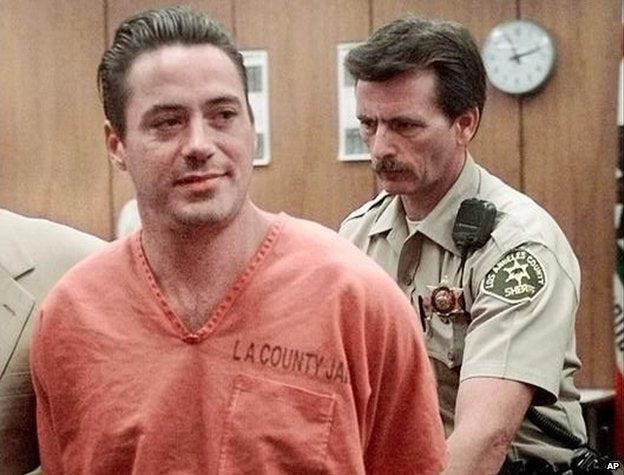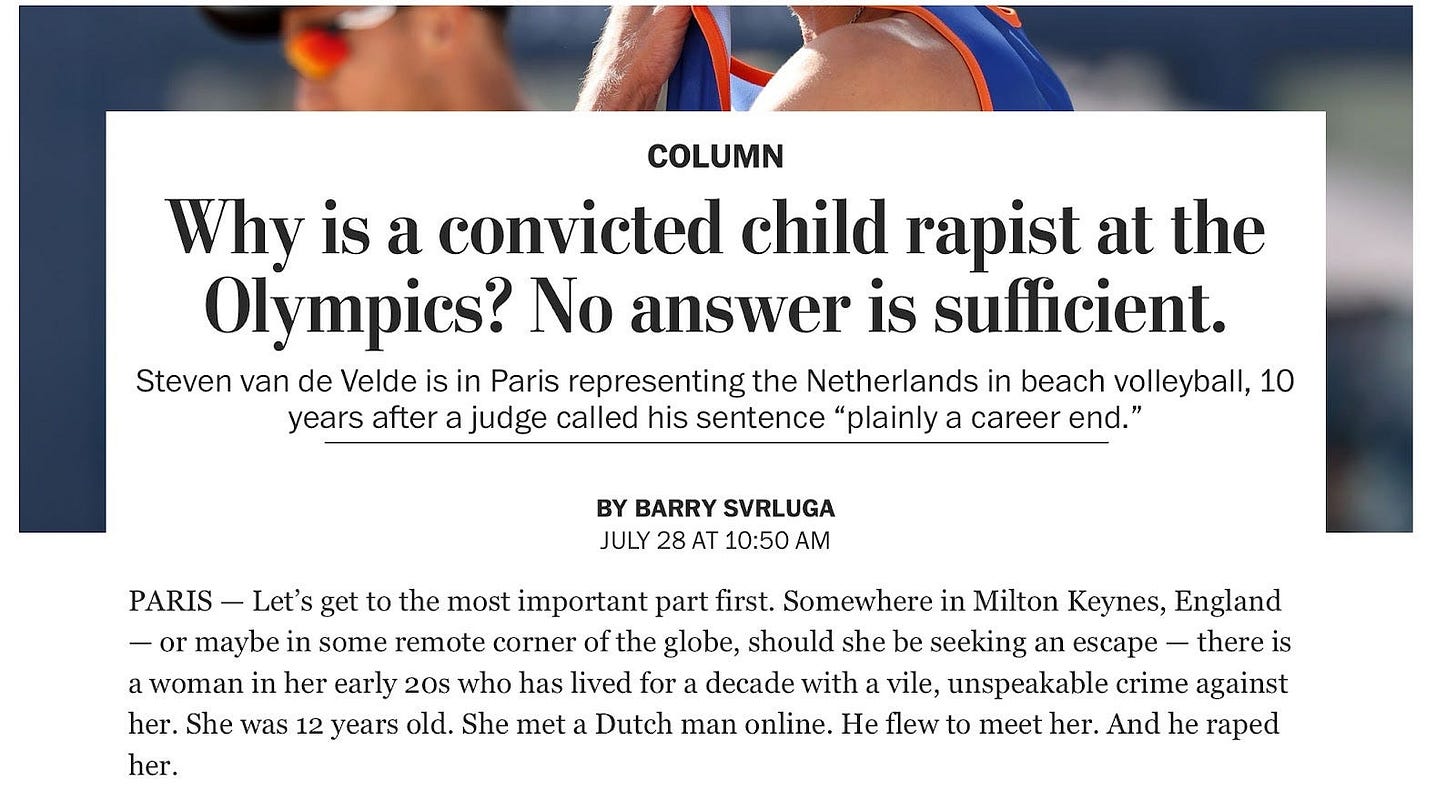Olympic Felon: Can Criminals Ever Be Forgiven?
Steven van de Velde's Participation in the Paris Olympics 2024
The Paris Olympics have caused quite a stir. There have been many discussions about the opening ceremonies, drones to spy on rivals, positive drug tests, banned nations, gender and sex in boxing, medal disputes, and an athlete trying to buy cocaine. Yet no controversy has been bigger than Steven van de Velde’s representation of the Netherlands in beach volleyball. Many people have complained about his involvement and numerous articles in the media have been written on the subject.

Steven van de Velde was incarcerated for raping a twelve year old girl. Futterman, a journalist, pointed out that this case is “testing views about crime, punishment, and rehabilitation.” We want to explore this because it is a case that shows the need for a history of crime which highlights underlying assumptions and potential problems. His participation in the Paris Olympics and the media’s discourse about it raise several issues in how modern societies think about crime, prison, rehabilitation, and justice.
Who is Steven van de Velde?
From a young age, Steven van de Velde showed promise in beach volleyball. In an interview he said that, while this was exciting, it was not without challenges. One of these was that his teenage years were spent mostly training and playing with older teammates. Thus, he claimed he missed many normal teenage experiences.
When he was 19, he befriended an English girl on Facebook. It is unclear who initiated contact, though he alleged that it was her who first messaged him (NOS). The girl and van de Velde spoke almost daily through Skype, Facebook, and Snapchat (Burrows). The two seemed to hit it off. At first, she told him she was 16, but as their relationship developed, she confessed she was 12 (Svrluga), after which he affirms to have broken off contact (NOS). He said they reconnected while he was allegedly having a rough time.
On August 2, 2014, van de Velde decided to go see the young twelve year old girl (Svrluga; Lawton). That same morning, he purchased a ticket and flew “to meet his victim in person” (Burrows). Van de Velde went to see her, and they drank some Bailey’s Irish Cream. They tried to get a hotel but they were refused, so they settled for a box under a staircase. They performed oral sex, which the judge said she instigated (Anon). The next morning, the young girl took him to her empty home where they had sex. He stopped when she said it was hurting (Anon). He did not ejaculate inside her. Van de Velde recommended that she get the morning after pill because they had not used protection. He returned to the Netherlands. When she went for the pill, it unleashed an investigation because of her age.
In 2015, van de Velde won a national beach volleyball championship (Burrows). His success suggested that he had a promising career ahead of him. He kept in touch with her until November 2015, when his lawyers advised him to break off contact because of the ongoing investigation. On January 8th 2016, he was extradited to the United Kingdom to be tried for raping a child.
At the trial, Van de Velde “pleaded guilty to three counts of raping a child” (Burrows). There was no conviction for grooming. His lawyer, Linda Strudwick, affirmed van de Velde was not a predator and that he had not made the trip with the intent to have sex (Burrows).
Van de Velde’s Prison Sentence
Steven van de Velde recognized and accepted guilt to three charges of raping a child. He was sentenced to four years. The judge, Francis Sheridan, told Van de Velde that he had caused great harm and that his victim would mature and “realize you are not the nice man she thought you were and hoped you might be” (Burrows). The judge, signaling that his career had ended, added the following (Svrluga).
“Your hopes of representing your country now lie as a shattered dream. Your actions in those two days in England have wrecked your life and you could, had you never come to England and committed these offenses, have been a leader in your sport” (Burrows).
The same court “acquitted him of grooming” (van der Zee) which his lawyers said showed he did not intend to rape the young girl. He was sentenced to four years in prison (Svrluga). After one year in a British prison, he was transferred to the Netherlands where he served another month (Svrluga).
In conjunction with his acquittal for grooming, and the judge's words regarding van de Velde not being the “nice man” the victim thought he was, it seems the young girl did not think she was forced. There are reports that his victim self-harmed. Most of the press that mentioned this, did not provide context and some readers may connect this to the abuse she endured (we certainly did). Other articles state she “felt racked with guilt” about his arrest which drove her to self-harm (Burrows). This also suggests she cared for him.
In an interview, van de Velde said that this was the biggest mistake he has made:
“Everyone wants to be liked, everyone wants to be respected, and with something like this on your record, it’s difficult. I can’t reverse it, so I have to carry the consequences. It’s the biggest mistake of my life” (Burrows).
We think this could have been a good opportunity to talk about victims rather than focusing about how his actions continue to affect him. Nevertheless, the program was about him and the words are translated, so it is hard to properly judge.
One of the underlying issues has to do with different ethics about sexual relations. There is variation around the world regarding the age at which someone can consent to engage in sexual relations. In some cases, laws distinguish sexual activity and sexual activity with an adult. In most cases, the age ranges from 14 to 16, but in some it is as low as 11 and as high as 21. In others, the only requirement is to be married. Some countries, like Niger, Chad, Bangladesh and the US even allow children to be wed. Despite these existing differences, we find the idea that an adult would sleep with a twelve year old repulsive.
Free After Only Thirteen Months
In the Netherlands, van de Velde’s conviction was reduced to time served and a month (Futterman). Thus, after having sex with a twelve year old, van del Velde served “just 13 months” (Futterman).
Van de Velde’s lawyer had argued that in the Netherlands rape is associated with “violent sexual assault without consent” (Burrows). She added that, according to Dutch law, the consequences of having “sex with minors is less strict than the law in England” (Burrows; Futterman). One reporter said that according to Dutch law, van de Velde’s actions are ontucht or “sexual acts that violate social-ethical norms” rather than rape (van der Zee). Chris Klomp, another reporter, has argued that there was no physical force or coercion as shown by the fact that he was acquitted of grooming. Klomp claimed that this distinction explained why so many Dutch people feel van de Velde should be able to move on with his life after having served time (van der Zee).
Burrows reported that van de Velde is now married (since 2022) to a German volleyball player who is also trained as a police officer. The couple have a child together. Some time after being released, van de Velde started competing again (Burrows). Since then he has represented the Netherlands at some tournaments and there were no associated scandals.
Nonetheless, this does not mean he should or should not be allowed to play. There is room for discussion regarding minimum sentences for crimes like these. One could also inquire how often are prisoners, convicted for similar crimes, given reduced sentences if they show good behavior. Likewise, it could be fruitful to study how often do these people reoffend. Van de Velde served time that corresponded with sentencing guidelines for the acts he committed.
Participating in the Paris Olympics 2024
The International Olympics Committee states that it is up to the national committee to select who will represent each nation, as there are no general guidelines about who competes (Burrows). Over eighty thousand people signed a petition asking the IOC to stop van de Velde from participating (Futterman; Svrluga). Several Dutch officials have defended their decision to allow him to partake in the Olympics.
The General Director of the Dutch Volleyball Federation described him as “an exemplary professional and human being” (Futterman). His teammate, Immers said that van de Velde’s case was a “big example that you can grow” (Futterman). Neither denies that what he did is reprehensible; yet both maintain he has become a better person.
Dutch officials have claimed that they are surprised by the amount of controversy van de Velde’s participation has caused. They assure that they have taken lots of safeguarding measures (Burrows). For example, he is not staying at the Athletic Villa (Svrluga). The Dutch Olympic Committee asserted that “Van de Velde has fully engaged with all the requirements and has met all the stringent risk assessment thresholds, checks and due diligence” (Svrluga). This Committee further added that experts have evaluated him and say there is no risk of recidivism (Svrluga). One could speculate what message does the separate lodging send.
Another article reported that, while the Dutch Olympic committee is within its rights to send van de Velde to the Olympics, the real question is “what message does the Netherlands send to the world by allowing itself to be represented by a man convicted of a sexual offense? It is obvious that not much thought has been given to how this might affect victims of sexual abuse” (van der Zee). Many of those who criticize his participation follow this line of argument and think that there are no conditions under which he should be allowed to participate.
According to a reporter, even some Dutch fans were conflicted about supporting him (Futterman). Nevertheless, they often said he had served his time and that thus, his participation was acceptable (Futterman). This tension suggests that there are significant differences in how people interpret the purpose of imprisonment and the degree to which people who commit crimes should be welcomed back into society.
Forgotten Crimes & Successful Careers
Steven van de Velde’s participation raises issues about the extent to which societies should welcome people who served time for criminal convictions. There are several famous individuals who have committed crimes or have been linked to criminal activity. These other examples can help us think about when it may be appropriate, if ever, to allow former criminals back into certain roles.

In the entertainment industry alone, there are a few cases to consider. Robert Downey Jr has been hugely successful after having served 15 months out of a three year sentence for possession of drugs and weapons. Others include: Mark Wahlberg (arrested for assault and battery), Jay-Z (drug dealing), Paris Hilton (drunk driving), Tim Allen (drug trafficking), Mick Jagger (drug possession). Likewise, other wrongdoers have been rightly exposed by the #MeToo movement. Various women have been subject to heinous behavior and some of their abusers are now facing the consequences. Recently, Joanthan Majors lost his role as Kang in the Marvel universe after his conviction for assault. Majors was upset that others like Ezra Miller (accused of harassment and grooming) have kept their jobs.
In the world of sports, Karim Benzema kept playing for Real Madrid after being found guilty of blackmailing a teammate with a sex tape. Bruno Fernandes, a Brazilian goalkeeper, returned to playing football after serving time for a twenty two year sentence for “ordering the murder of his son’s mother”. Serge Aurier got two months in prison for hitting a police officer. Breno Rodrigues, an arsonist, served about half of his four year sentence and then returned to the world of football. Adam Johnson retired from football after accepting he groomed a 15 year old girl and had sexual contact with her. Other players have been convicted after they retired, Ronaldinho (fake passports), George Best (driving drunk and assaulting a police officer) and more notoriously Dani Alves (currently on trial for rape). There are many other cases that we could explore.
None of this is to say that van de Velde should or should not participate. We merely want to point out that there are cases where people have committed crimes and they have been welcomed back into their professional and public lives. On the other hand, there are cases where people have not been welcomed back into society.
One of the differences is that van de Velde served his time, as did Downey Jr. In contrast, Majors is yet to serve time and others like Benzema were given suspended convictions. Another difference may have to do with the types of crimes these people committed. In the past, WADA has banned athletes from participating under their country’s flags due to doping violations. In the 1992 Olympics, three British athletes were sent home for testing positive for steroids.
Other Olympics Misdeeds
National Olympic Committees have stopped people participating for many reasons. For example: Sha’Carri Richardson tested positive for marihuana during track and field trials and was withdrawn from the Olympics team. This decision was made by the US Athletics. The World Anti Doping Agency (Wada) identifies three kinds of substances that it bans: those that harm the athlete, enhance their performance, or go against the spirit of the sport. Previously, the IOC tried to remove a gold medal because an athlete tested positive marihuana, but a court returned the medal because there was no such rule. The IOC then instituted one. The perspective regarding marihuana is rapidly changing. In 2012, the Swiss Olympic committee (not the IOC) expelled Michel Morganella after he made a “racist tweet.” A little over six months later, he was called back into the national team and Swiss National Coach, Ottmar Hitzfield, saying the player had apologized, shown regret and growth. These differences may suggest that the IOC needs to have a bigger role in establishing selection criteria.
Some Representative Press Coverage About Van de Velde’s Participation
Most of the Press has been very critical of van de Velde’s participation. For example, The Washington Post published an article on July 28 where they questioned “Why is a convicted child rapist at the Olympics? No answer is sufficient '' (Svrluga). This article imagines how the victim is doing and states that “no amount of punishment to her assailant” can change how she is (Svrluga). Given UK privacy laws, her identity is unknown. Hence we do not know how she is and nor do the many people who have written about her.
Svrluga wrote “He had done his time, they said. He was remorseful, they said. He earned the spot, they said.” Svrlunga briefly described the first game he played in, only to add “Come on. None of this matters. This guy should not be here.” The author added “Yes, it’s possible to have second chances and to reform. Van de Velde has a wife and a child. He is free and living his life. Isn’t that enough”(Svrluga). This author suggested that freedom is more than enough after the crime van de Velde committed.
Articles in the Athletic stated “There is no way to sugarcoat this…a convicted child rapist…played beach volleyball underneath the Eiffel Tower.” Another reporter wrote that this was “the nastiest storyline” at the Olympics (Estes). She expressed frustration that no one has “stood up” for “what’s right” and stopped him from participating (Estes). In this article, a person who committed such crimes may never again have certain roles.
A former athlete who defended his participation later apologized. In The Sunday Times, Paula Radcliffe had said van de Velde “shouldn’t be punished twice” and wished him “best of luck” (Lawton). She said that banning certain people from competing could be problematic given that even people who cheat are allowed back (Lawton).
Radcliffe apologized for wishing him luck, “I was confused in my head and responding to the right to ban him from the Games and I don’t know why I wished him luck. Again I apologize” (Lawton).
Later she issued a further statement apologizing and condemning rape. She added, “I am ashamed that my words so inaccurately represented myself. It was a mistake not to clearly denounce this at the beginning. In trying to explain how the athlete in question could possibly be allowed to compete at the Olympic Games, my thought process referred to the legalities and regulations when I also intended to highlight the danger of allowing an athlete convicted of such a crime to return” (Lawton).
Another article questioned whether van de Velde should have been allowed to participate given that Olympians are also “expected to serve as role models” (van der Zee). This article reported that there has been no indignation or controversy in the Netherlands (van der Zee). Questions could be raised as to the desirability of role models (in general). There has been no similar discussion whether an athlete who tried to procure cocaine or those who took enhancing drugs make good role models. Nor have Olympians with Onlyfans accounts been chastised for sexualizing their bodies and setting a “bad example” (Note: we have no problem with them doing so).
The discourse about van de Velde has raised several issues worth pondering about. He said that asking whether someone with his history should be able to stand at the podium is a valid question, while insisting he is now a different person.
Exploring the Controversy
Most of the criticisms about van de Velde’s participation can be categorized into the following.
He should not be an Olympian: This argument is that he should not be allowed to participate in the Olympics, even if he has served time and presumably rehabilitated. This sounds like a reasonable position but raises other issues. One reporter said he had enough of a second chance because he was free. Let us suppose he is not allowed to be an Olympian but what is he allowed to do instead? Is he allowed to drive a cab ? Wait tables? Paint? Become a mathematician? What does this mean about the relative value of an individual Olympian versus those who do other jobs? What does this tell those doing those jobs? Does this argument not imply that their jobs are enough for a child rapist? There are other cases where one could argue safeguarding may be a bigger issue and thus some limits could be justified (i.e. school teacher). Nevertheless, it seems difficult to draw principles with which we could distinguish which jobs a presumably rehabilitated person can do, and which ones are beyond their reach.
Message to the world: Press coverage suggests that the message the world gets is that child rapists can be Olympians and hence child rape is not as important as sports. On the other hand, one could construct a compelling narrative on why reformed criminals should have public roles. These could serve to show cases where the justice system has succeeded in transforming a troubled person into a “good” citizen. Tell us what you think.
Short prison sentence: There is no question van de Velde did something horrible, and he was in prison for a relatively short time. This is also a compelling argument, and though it is being made about him, it really should be about the justice system in the U.K. and the Netherlands. These nations have systems and structures designed to prevent crime, reduce recidivism, and to ensure people who commit crimes face consequences. By all indication it seems he was tried and sentenced in accordance with these systems. His arguably short sentence merits a wider conversation, but it should be about systems and structures rather than an individual.
The Act itself: There is no doubt in our mind that no adult should have sexual relations with a child, even if these were legal. We find child marriage disgusting, abusive, and reprehensible. Van de Velde pleaded guilty to three counts of child rape. Also, The British Court acquitted van de Velde of grooming and there appears to have been no forceful coercion. We think that every instance of sex without consent is rape. The differences between Dutch and British definitions of rape are worth considering in thinking about this case. British law does not make the same distinctions as the Dutch system. Even if there had been no sexual contact, we still condemn a 19 year old providing alcohol to a 12 year old.
Role Models: One of the articles explicitly stated that athletes should be role models. In others, this seems implied. But what are the standards by which we select such people to emulate? Do we search for idealized role models or do we want role models that are multi-dimensional and do some things well and others poorly? However, raping a child is far worse than doing something poorly. Stories about transformation can also be important, but these require conversations about what is redeemable and what is not.
Other misdeeds: Some commentators have argued that van de Velde should not have been allowed to participate because other athletes who misbehaved were excluded. There is a lack of coherence between how National Olympic Committees make decisions. WADA currently lists marihuana as a drug taken to enhance performance and it is conceivable that should change. Athletes in the past have had to hide their sexuality because they were perceived as deviant. None of this is to minimize how horrible we think his actions were. We merely wanted to mention that decisions to exclude or not exclude athletes were taken by National Olympic committees. An argument could be made about the IOC developing criteria to exclude people who have engaged in certain criminal activity from participating.
In writing this article, we have abstained from issuing judgment regarding this particular individual. We rather focused on exploring the public discourse surrounding a convicted criminal participating in the Olympic Games, and the main problems raised in relation to how society understands crime, punishment and reintegration to society. Public opinion most certainly appears divided, and there seems to be wide inconsistencies in what type of crime is considered redeemable and which isn’t.
We’d be interested in hearing your opinion in this matter. Do you think he should be allowed to participate? If not, what should Steven Van de Velde be allowed to do? Can someone ever be considered rehabilitated after committing such a crime?Let us know in the comments.









It is certainly controversial and a subject that should open a wider discussion about these kinds of issues, not just in the West, but worldwide.